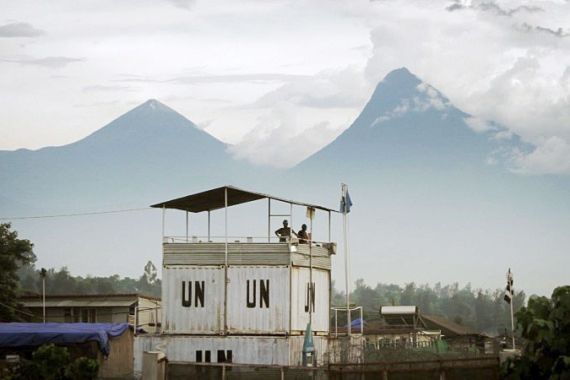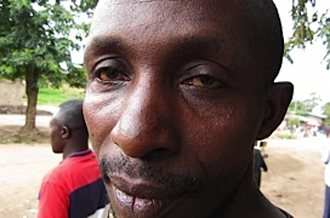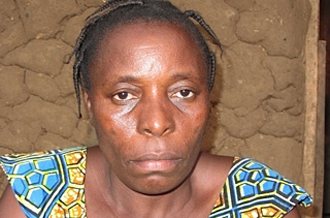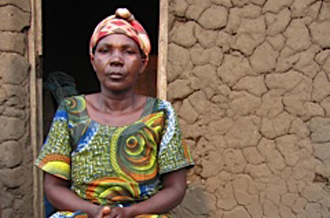Revisiting DR Congo’s massacre site
Both justice and peace elude residents of Kiwanja in North Kivu, as rebel group renews assault on government troops.

Kiwanja, Democratic Republic of the Congo – The bullets have long stopped, but scars still run deep in Kiwanja, the scene of one of the worst massacres by a rebel group in the country’s North Kivu province.
Kiwanja is in the sprawling hills of Rutshuru Territory, northwest of Goma, 26km from the border with Uganda.
Hutus, Tutsis and Nandis live here, with Hutus forming the majority of the population.
In 2008, at least 150 people were killed in just over 24 hours in the small but strategic town.
| Ndorere Mbiramba, 48 | ||
“I don’t believe we will get a lasting peaceful solution in North Kivu. Our villages are teeming with rebels, different cells are sprouting up every other day, the government seems incapable of dealing with the issue. We just leave our fate to God.” |
Laurent Nkunda led the rebel group National Congress for the Defence of the People (CNDP), which is accused of carrying out the massacre. His chief of staff, Bosco Ntaganda, headed the operation. He is wanted by the International Criminal Court for recruiting child soldiers while in another rebel group in South Kivu province.
Kiwanja is a vibrant town today. In the evenings, traders shove and shout, trying to sell off what they can before dark, while others rush home or are busy catching up on the latest gossip.
About 16km from the town is a military base of the United Nation’s peacekeeping mission. Next to the base is an internally displaced persons camp, which was set up in 2004. It continues to host displaced people running from violence in other parts of North Kivu, an area teeming with different rebel groups.
When the killings took place, a contingent of about 100 United Nations peacekeepers were at their base, unaware of what was happening outside the gate until it was all over. The UN said that the peacekeepers were short of equipment and men, and that they were focussing on evacuating frightened aid workers and searching for a foreign journalist who had been kidnapped. Already overwhelmed, officials said, they had no intelligence capabilities or even an interpreter who could speak the necessary languages.
Nyaranzinza Senzoga stills thinks about that day in November. “I remember gunshots. The rebels ordered us to open our door and when we wouldn’t, they broke in. My sons had hidden under the bed, the men with guns sprayed them with so many bullets, I could hardly recognise them when I was burying them,” she said.
Unfettered cruelty
Ndorere Mbirambo lost 14 of his relatives in different parts of Kiwanja. Among them was his sister and her child.
| Adelina Marka, 56 | ||
“CNDP came and killed our men, they robbed us off our little belongings, our money. Those people are evil. We want them arrested and justice done. They’ve killed too many people.” |
“Many of the people were killed when running,” he remembers. “There were so many bodies, the stench was so bad. Most were buried where they fell – the rebels just covered their bodies with soil. We were too afraid to come and bury them properly.”
The rebels were targeting men, claiming that they were members or sympathisers of the Mai Mai, a rival rebel group that had earlier ambushed them.
It all started In October 2008, when Congolese troops fled the town, fearful of the advancing Nkunda- and Bosco-led fighters. The rebels took the towns of Kiwanja and Rutshuru without firing a single shot. None of the armed officers were anywhere to be seen. A week later in November, the Mai Mai rebel group carried out a surprise attack on Nkunda and his men, who immediatey repulsed them.
But the people of Kiwanja paid the ultimate price: young men were killed on sight. The rebels claimed that they were killing members of Mai Mai, but survivors say those killed were innocent.
The executions in Kiwanja were a study of the unfettered cruelty meted out by the armed groups fighting for power and resources in eastern Congo.
The CNDP militia was later integrated into the national army in 2009. Laurent Nkunda was arrested and handed over to Rwanda, while Bosco Ntaganda was promoted to the rank of general in the army.
Until recently, General Ntaganda lived in luxury in Goma. He is one of the wealthiest and most powerful people in North Kivu.
Now the ICC has issued a fresh warrant for his arrest for crimes committed in South Kivu in 2006. At the time, Ntaganda was in another rebel group led by Thomas Lubanga, who has been convicted for recruiting child soldiers.
But Ntaganda’s peace with government was shortlived. Having broken away from the national army in April, the CNDP, now calling itself M23, has staged a spirited battle against government troops.
Renewed fighting
Jacqueline Nyirabatechi is a victim of the renewed fighting around Bunagana, the strategic town at Congo’s border with Uganda. She arrived in Kiwanja a few days ago.
| Nyaranzinza Senzonga, 50 | ||
“I always imagine the rebels coming back; it’s always a nagging thought at the back of [my] mind that I cannot shake off. “I forgive those who killed my sons. I am a Christian and I know God will punish them.” |
“I came here with my three children. I don’t know where four are. We all scattered when we heard gunshots; they probably ran to Uganda or the bush. I’m very worried about them.”
Now, as after the 2008 massacre, Rwanda is said to be pushing for fresh negotiations between the Congolese government and M23, which is also keen to renegotiate the peace deal signed with the government that reintegrated them into the army. Joseph Kabila, the president of Congo, says he will not negotiate.
The president of the civil society in North Kivu, Thomas D’Aquin, is also vehemently against negotiations with the rebels.
“M23 is a continuation of CNDP. It is all the same thing. When you are looking for peace, the law must be followed. Anyone who takes arms against the government is a traitor and must be punished.”
M23 says that General Ntaganda is now out of the picture, and will have no bargaining power. Colonel Sultani Makenga now leads the group.
But that comes as little solace for survivors of the Kiwanja massacre. They are disillusioned and do not expect any justice with rebels still roaming the region.
As one survivor put it: “I have forgiven those who killed my sons. I’ve left the perpetrators to God’s justice.”


